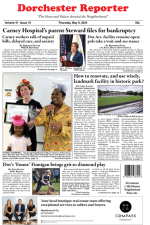December 4, 2019

Mayor Walsh joins Councillor Kim Janey and other city and state elected officials for a signing ceremony of the ordinance. Katie Trojano photo
Mayor Martin Walsh signed a city ordinance last Tuesday that creates a Cannabis Equity Board meant to ensure that at least half of the potential licenses issued in Boston go to companies owned by people of color. The legislation was approved by the City Council the week before by a 12-1 margin, with Councillor Kim Janey of Roxbury its lead proponent.
“This ordinance that I’m about to sign today helps right the wrongs of the past, certainly since the 1970’s and the American war on drugs which has been devastating to a lot of people,” said Walsh, “but most importantly in communities of color.”
He added: “Across the country people of color have been disproportionately arrested for low-level drug crimes over the past four or five decades. This has contributed to cycles of poverty and pain over generations. We have an opportunity here in Boston to undo some of that damage.”
The law allows for the creation of a Boston Cannabis Equity program, which will include funds for technical equipment and resources for applicants. The City Council has set aside $500,000 for the program over the last year and Walsh said that amount will be matched out of the first three percent of cannabis revenue.
Janey spoke about the importance of multi-faceted collaboration in aiming for economic equity in the city.
“This is an important step when it comes to economic development. We have to do everything that we can to dismantle this pipeline to prison that continues to criminalize black and brown people, particularly our young people,” she said.
“Together the mayor and the council are taking a very important step forward,” she added. “I have to thank the many advocates, activists, and entrepreneurs who are all in this space. They gave time and attention to this.”
Janey said Massachusetts is taking a national lead in mandating that equity be factored into the burgeoning marijuana industry. “While we all know that Massachusetts was not the first state to legalize [recreational marijuana,] it was the first state to mandate equity,” she said. “And it is so important to make sure that communities that have been locked up are not locked out of this economic opportunity to build wealth and break cycles of generational poverty.”
Walsh said he will work with the Council in moving the legislation along. “What we are about to pass is landmark when it comes to the cannabis industry in the country,” he said. “We’re going to create a Boston Cannabis Board that will evaluate and vote on license applications publicly using a criteria.”
The bill creates a new category of municipal “equity applicants,” which will include companies with 51 percent or more of an ownership stake from three or more of the following criteria:
A person who has resided in an area of disproportionate impact for at least 7 of the past 10 years; a Boston resident who has a past arrest or conviction for possession, sale, manufacturing or cultivation of marijuana between 1971-2016 and who has been a resident of Boston for the past 5 years; someone who has resided in Boston for at least the last 5 years.
Also, someone who is of black, African American, Hispanic, Latino, or Asian descent; someone whose annual household income is at or below 100 percent of the area median income, or someone who is certified by the Cannabis Control Commission as an Economic Empowerment Applicant.
The Walsh administration has approved 14 host community agreements with marijuana businesses seeking to open in the city, which includes three state-certified empowerment candidates.
Janey said that she’s looking forward to continuing her work with advocates and entrepreneurs to “create a pathway for all of us to win.” For Walsh, “this ordinance is one of many steps taken to make our economic economy more inclusive. We’re working to create pathways into the middle class, especially for women and people of color.”

Get the Dorchester Reporter— the paper of record for Boston’s largest and most diverse neighborhood—delivered to your door for just $30 per year.
That's 52 weeks of the Dorchester Reporter delivered by USPS for just $30.
Support our brand of community journalism AND get the print edition delivered to your door each week— the best deal in town!
Click here to submit your order with PayPal:
Or call 617-436-1222.



